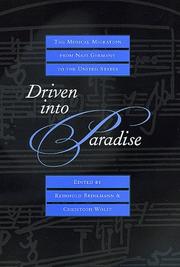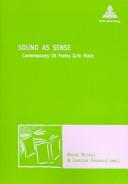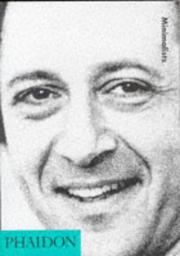| Listing 1 - 6 of 6 |
Sort by
|
Book
ISBN: 0190872330 0190872322 0190872349 9780190872328 9780190872335 9780190872342 9780190872311 0190872314 Year: 2018 Publisher: New York, NY : Oxford University Press ,
Abstract | Keywords | Export | Availability | Bookmark
 Loading...
Loading...Choose an application
- Reference Manager
- EndNote
- RefWorks (Direct export to RefWorks)
1917, the year the United States entered World War I, was transformative for American musical culture. The European performers who had dominated classical concert stages for generations came under intense scrutiny, and some of the compositions of Austro-German composers were banned. This year saw the concurrent rise of jazz music from a little-known regional style to a national craze. Significant improvements in recording technology facilitated both the first million-selling jazz record and the first commercial recordings of full symphony orchestras. In a segregated country, as the US military wrestled with how to make use of several million African Americans who had registered for the draft, James Reese Europe broke down racial barriers with his Fifteenth New York National Guard Band. This book tells the story of this year through the lives of eight performers

ISBN: 0520214137 9780520214132 Year: 1999 Publisher: Berkeley ; Los Angeles ; London University of California Press
Abstract | Keywords | Export | Availability | Bookmark
 Loading...
Loading...Choose an application
- Reference Manager
- EndNote
- RefWorks (Direct export to RefWorks)
Music --- anno 1900-1999 --- Germany --- United States --- Austria --- National socialism and music. --- Exiles --- Musicians --- History and criticism. --- History --- Biography. --- Nationaal-socialisme en muziek --- National socialism and music --- National-socialisme et musique --- 20th century --- History and criticism --- Europe --- Biography --- Music - United States - 20th century - History and criticism. --- Exiles - Germany - History - 20th century. --- Exiles - Austria - History - 20th century. --- Musicians - Europe - Biography.
Book
ISBN: 9782940068418 2940068410 Year: 2012 Publisher: Genève : Contrechamps,
Abstract | Keywords | Export | Availability | Bookmark
 Loading...
Loading...Choose an application
- Reference Manager
- EndNote
- RefWorks (Direct export to RefWorks)
Histoire sociale des productions les plus originales du monde musical américain, de Charles Ives au minimalisme (1890-1990)Cette histoire de la musique américaine replace les différents courants et genres musicaux dans leur contexte économique et social. Elle ne se limite pas aux compositeurs, de Charles Ives à John Adams, mais inclut les différentes formes de musique populaire, depuis la chanson engagée jusqu’au jazz, en passant par les comédies musicales de Broadway. Laurent Denave analyse les tensions entre une sphère savante tôt divisée entre des créateurs originaux et des compositeurs conservateurs ou académiques, et une sphère populaire dominée par les critères commerciaux et davantage faite pour le peuple que par lui. Que ces critères commerciaux s’introduisent à l’intérieur de la musique savante, c’est précisément ce que l’auteur montre à travers différents exemples historiques, qui conduisent à la musique répétitive, assimilée ici à la révolution conservatrice qui eut lieu sur le plan politique.Laurent Denave souligne à quel point le critère de la modernité musicale aux États-Unis est lié à la capacité d’autonomie des compositeurs et comment – à partir de la figure isolée de Charles Ives, qui fonda sa propre compagnie d’assurances et composa durant son temps libre – cette autonomie a tenté de se structurer socialement à travers différentes institutions, dont l’Université a finalement été l’une des plus importantes. Mais il montre aussi comment cette modernité a été tout au long du siècle aux prises avec les diverses formes de conservatisme et de populisme, ainsi qu’avec les intérêts commerciaux de l’industrie musicale. L’analyse sociologique des conditions mêmes de la musique savante fait apparaître l’exclusion de certaines catégories sociales. Fondé sur une documentation impressionnante, écrit d’une plume alerte et vivante, cet ouvrage nous permet de traverser de façon originale une histoire encore mal connue, et jamais présentée ainsi dans son ensemble dans un ouvrage français.Laurent Denave est diplômé de l’Université de Bourgogne et de Paris-Sorbonne (Paris IV). Il prépare actuellement une thèse de Doctorat sur Charles Ives à l’École des Hautes Études en Sciences Sociales.
Composition (Music) --- Music --- Composition (Musique) --- Musique --- History and criticism --- Social aspects --- Histoire et critique --- Aspect social --- Ives, Charles, --- History --- Criticism and interpretation --- Music - Social aspects - United States - History - 20th century --- Music - United States - 20th century - History and criticism --- Ives, Charles, - 1874-1954 - Criticism and interpretation --- Ives, Charles, - 1874-1954 --- Musique -- aspect social --- Musiciens américains --- Etats-unis --- 20e siècle --- Sociologie
Book
ISBN: 128311643X 9786613116437 1580467660 1580463495 Year: 2010 Publisher: Rochester, N.Y. : University of Rochester Press,
Abstract | Keywords | Export | Availability | Bookmark
 Loading...
Loading...Choose an application
- Reference Manager
- EndNote
- RefWorks (Direct export to RefWorks)
A collection of essays on new music, composers, and issues in American music criticism and aestheticson by composer and music theorist Robert Morris. The Whistling Blackbird: Essays and Talks on New Music is the long-awaited book of essays from Robert Morris, the greatly admired composer and music theorist. In these essays, Morris presents a new and multifaceted view ofrecent developments in American music. His views on music, as well as his many compositions, defy easy classification, favoring instead a holistic, creative, and critical approach. The Whistling Blackbird contains fourteen essays and talks, divided into three parts, preceded by an "Overture" that portrays what it means to compose music in the United States today. Part 1 presents essays on American composers John Cage, Milton Babbitt, Richard Swift, and Stefan Wolpe. Part 2 comprises talks on Morris's music that illustrate his ideas and creative approaches over forty years of music composition, including his outdoor compositions, an ongoing project that began in 1999. Part 3 includes four essays in music criticism: on the relation of composition to ethnomusicology; on phenomenology and attention; on music theory at the millennium; and on issues in musical time. Threaded throughout this collection of essays are Morris's diverse and seemingly disparate interests and influences. English romantic poetry, mathematical combinatorics, group and set theory, hiking, Buddhist philosophy, Chinese and Japanese poetry and painting, jazz and nonwestern music, chaos theory, linguistics, and the American transcendental movement exist side by side in a fascinating and eclectic portrait of American musical composition at the dawn of the new millennium. Robert Morris is Professor of Music Composition at the Eastman School of Music, University of Rochester.
Music -- 20th century -- Philosophy and aesthetics. --- Music -- United States -- 20th century -- History and criticism. --- Music. --- Music --- Music, Dance, Drama & Film --- Music Instruction & Study --- Music History & Criticism, General --- History and criticism --- Philosophy and aesthetics --- United States. --- Aesthetics. --- American music criticism. --- American transcendental movement. --- Composers. --- Holistic approach. --- Music composition. --- Musical examples. --- New music. --- Robert Morris. --- History and criticism. --- Philosophy and aesthetics.

ISBN: 905201194X 0820466107 9789052011943 9780820466101 Year: 2003 Volume: 11 Publisher: Bruxelles Lang
Abstract | Keywords | Export | Availability | Bookmark
 Loading...
Loading...Choose an application
- Reference Manager
- EndNote
- RefWorks (Direct export to RefWorks)
It has often been claimed that writing about music is like dancing about architecture. The general distrust of methods that combine or aggregate knowledge from different research fields, and therefore tend to elide or smooth out some of their particularities, may account for the paucity of critical writing dealing not only with the role of voice and song in poetry but also with the history of the interdependencies of verbal, textual and musical materials in the broader context of contemporary American literature. The purpose of this book is to develop an informed and imaginative understanding of the interrelationships between poetry and music in a way that reflects the diversity and richness of contemporary artistic practice in the US since the beginning of the 20th century. Related topics such as theories of representation, the aesthetics of rhythm, the material production of literature and music, the links between poetry, politics and popular culture, the making of music from literary texts, or literature from musical models, all provide the focus for a study that deals with the theoretical and practical interrelationships between poetry and music.
Amerikaanse letterkunde --- Littérature américaine --- Musique --- Muziek --- American poetry --- Sound poetry --- Music --- Music and literature --- Sound in literature --- History and criticism --- History --- Phonetic poetry --- Poesie sonore --- Sonorist rhythms (Poetry) --- Sound poems --- Poetry --- Sounds in literature --- American poetry - 20th century - History and criticism --- Sound poetry - History and criticism --- Music - United States - 20th century - History and criticism --- Music and literature - History - 20th century --- Poésie américaine --- Musique dans la littérature --- Musique et littérature --- 20e siècle --- États-unis --- Histoire et critique

ISBN: 0714833819 9780714833811 Year: 1996 Volume: *13 Publisher: London Phaidon
Abstract | Keywords | Export | Availability | Bookmark
 Loading...
Loading...Choose an application
- Reference Manager
- EndNote
- RefWorks (Direct export to RefWorks)
Music --- anno 1900-1999 --- Minimal music --- Musique répétitive --- Composers --- Compositeurs --- Musique --- Biography. --- History and criticism. --- Biographies --- Histoire et critique --- minimalisme --- componisten --- 20e eeuw --- muziek --- muziekgeschiedenis --- 78 --- Biography --- United States --- 20th century --- History and criticism --- Meditative music --- Minimalism (Music) --- Minimalist music --- Music, Minimal --- Repetitive music --- Systematic music --- Composers - Biography. --- Minimal music - History and criticism. --- Music - United States - 20th century - History and criticism. --- Minimalisme --- Muziekgeschiedenis --- Stijlstudies --- Discografieën --- Iconografie --- Amerika --- Noord-Amerika --- Verenigde Staten van Amerika --- Groot-Brittannië --- Engeland --- Nederland --- Estland --- Young, La Monte --- Riley --- Reich, Steve (1936-) --- Glass, Philip --- Adams, John --- Monk, Meredith --- Nyman, Michael --- Andriessen, Hendrik --- Andriessen, Louis --- Pärt, Arvo (1935-)
| Listing 1 - 6 of 6 |
Sort by
|

 Search
Search Feedback
Feedback About UniCat
About UniCat  Help
Help News
News